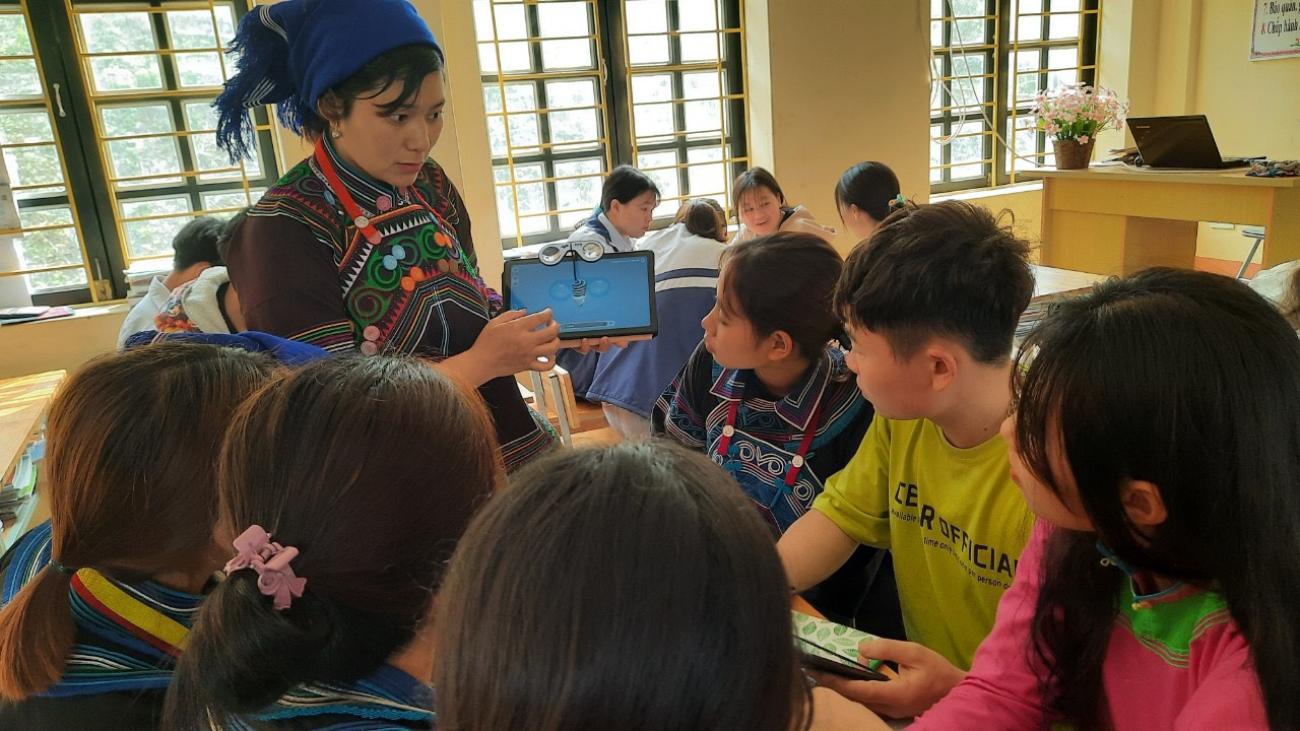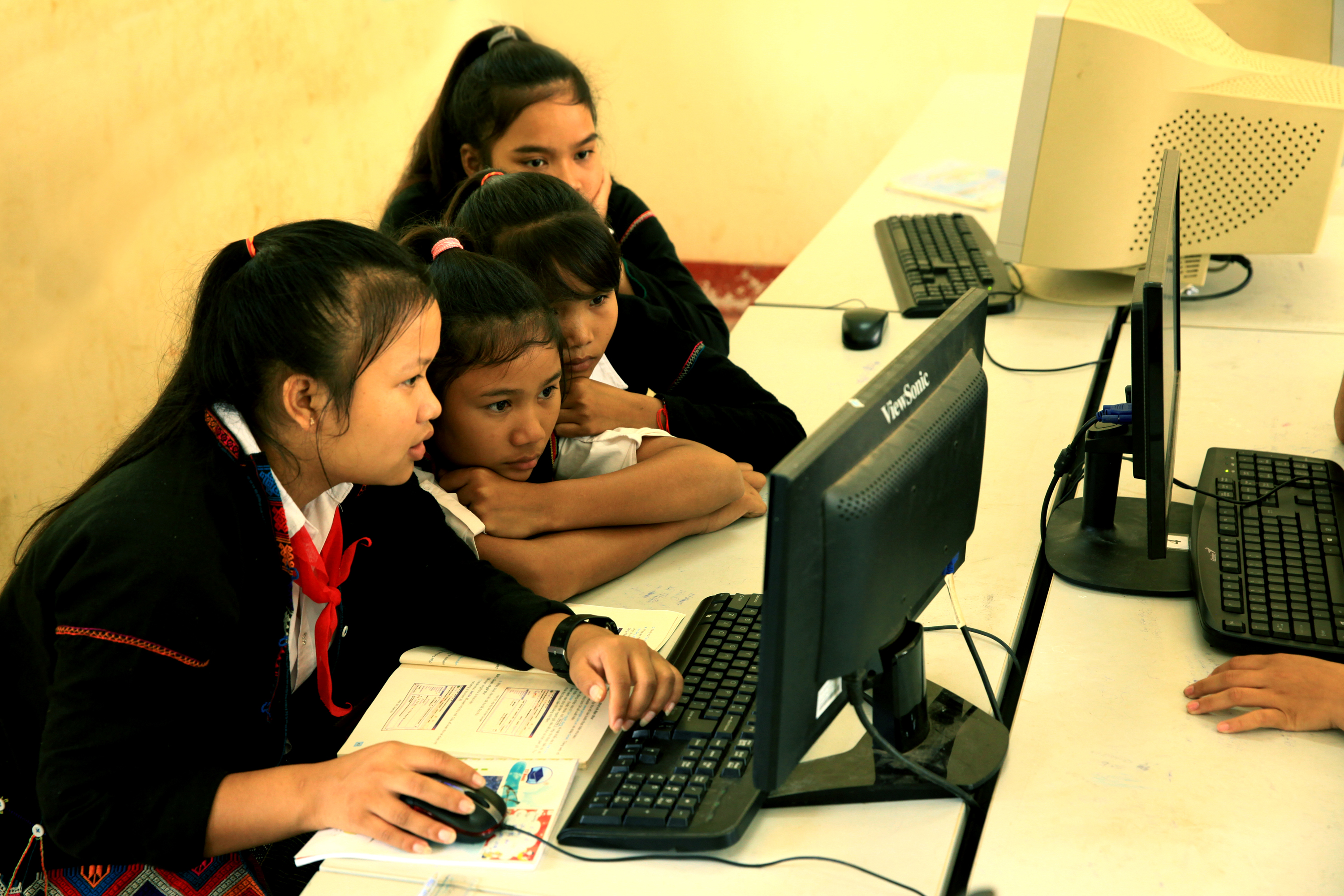Leveling the Digital Field for Women and Girls in Viet Nam

Trang Tho Pe, an award-winning technology teacher in Lao Cai, Viet Nam, uses tablets, computers, and virtual/augmented reality (AR/VR) tools to teach her students, opening a world of opportunities for them. She can share her passion for learning and technology with the knowledge she acquired through her training from UNICEF's Skills4Girls programme. Trang used to walk four kilometres to school and studied by oil lamps in a bamboo and palm leaf shelter. Her personal experience shines through her belief that “Girls are hardworking and perform well in class.”
Imagine a future where Trang’s ability to leverage tech to drive progress is the norm, and every woman and girl in Viet Nam are equal digital citizens empowered to harness digital technology to transform their lives and communities. As the UN Resident Coordinator leading the work of the UN in the country, I am personally committed to our engagement in fully unlocking this potential.
Digital transformation is a top priority for the Vietnamese Government, with the Politburo Resolution 57 calling for breakthroughs in science, technology and innovation. Women and girls, who make up more than half of the country's population, especially ethnic minorities, LGBTQI+, and those with disabilities, still face barriers to accessing digital tools and are vulnerable to digital threats. Tackling these issues is crucial for continued growth and development.

A shared commitment for gender equality in tech
The country made significant strides in ensuring the rights of women and girls. A robust legal framework is in place to promote gender equality, including on prevention of domestic violence, protection against human trafficking and fostering equitable employment. Most recently, Viet Nam introduced gender-responsive provisions aimed at closing the gender gap in accessing social insurance.
To support national initiatives, the UN in Viet Nam collaborates with partners to close the gender gap in digital access and skills, ensuring women and girls can compete for quality jobs and innovate for their communities. In terms of online safety, we promote gender-sensitive strategies for effective prevention, protection, prosecution and support. And we are preparing for the formal signing ceremony of the landmark UN Convention against Cybercrime in Hanoi, an event that highlights Viet Nam’s aspiration to be a global leader in this area.
Our work is grounded in data and evidence. The Viet Nam Provincial Governance and Public Administration Performance Index (PAPI) highlights that women face persistent barriers in accessing the internet, using e-services, and understanding public institutions. These challenges restrict their participation in the digital economy and public life. Recognizing this, our team works with national partners to expand digital literacy, improve access to technology, and develop inclusive e-governance solutions.
I have seen firsthand the incredible impact that women and girls can have in tech when given the opportunity to lead. From entrepreneurs leveraging digital platforms to young girls learning to code and innovate, the potential is enormous. However, to fully unlock this opportunity, we must address barriers that hinder equality, including technology-facilitated gender-based violence (TFGBV) and crimes, particularly in rural and remote areas, where access to technology and protection measures tends to be limited. Targeted policies and investments in infrastructure and human resources are needed.
Leveraging global commitments to unlock local gains
Education and training are critical. The Vietnamese Government and our UN in Viet Nam team collaborate on this, providing expertise and resources. For example, UN Women held an awareness-raising initiative on job security for women and girls in the digital era while UNDP’s Empower Her Tech programme trained women entrepreneurs on AI and emerging technologies.
We also actively work with and for ethnic minority women and girls:
- UNICEF’s Skills4Girls programme provides rural schools access to AR/VR technologies, coding classes, and EdTech solutions.
- UNDP’s 4M Solution connects ethnic minority female micro entrepreneurs with e-commerce partners and mentors to grow their businesses using digital tech.
- And we support initiatives to break down stereotypes in the Science, Technology, Engineering, Arts, and Mathematics (STEAM) field, such as “STEAM for Girls - Green STEAM for female students 2024,” a competition, co- organized by the Vietnam Institute of Educational Sciences, UNICEF and the Victoria School.
On boosting online safety and tackling TFGBV, UN Women supports the security sector through access to training materials and opportunities. The agency also produces a Handbook on cybersecurity for women leaders and the first Viet Nam specific provision for the protection of women and girls in cyberspace in the Viet Nam’s Women, Peace and Security National Action Plan. For its part, UNFPA built an online platform to inform on TFGBV and campaigned against image-based abuse.
On the policy side, we are championing the development and implementation of gender-responsive approaches so women and girls have equal opportunities for leadership and decision-making roles in tech. Our work, which I am personally invested in, fosters a culture of inclusion and diversity to boost economic growth while empowering women and girls.
Recent developments promoting digital equality at the international level parallel our activities on the ground. The Political Declaration adopted at the 69th session of the Commission on the Status of Women last March outlined a shared commitment to ensuring women and girls can fully participate in the digital age and called for stronger investment in digital literacy and expanded access to digital tools and infrastructure. This follows world leaders’ commitment at the 2024 Summit of the Future, which culminated with the adoption of the Pact for the Future and the Global Digital Compact to “expand inclusion in and benefits from the digital economy for all.”

Building a Digital Future for All Vietnamese
In Viet Nam, we join hands to turn words into actions. I am privileged to lead our UN country team during this transformative period. The digital era presents a unique opportunity for all Vietnamese, particularly women and girls, to take a leading role in ushering in the new “Era of National Rise.” By breaking remaining barriers that hinder the full participation of women and girls in the digital revolution and ensuring equal access to digital technology, we can create, just like Trang Tho Pe, a more inclusive and prosperous future for all.
Together, we can build a digital future that leaves no one behind.
This blog was written by the UN Resident Coordinator in Viet Nam Pauline Tamesis, adapted from an interview she gave The World and Vietnam Report. To read more coordination results from Viet Nam click here.













